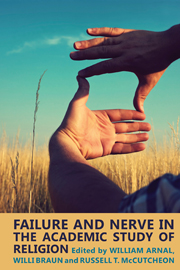Book contents
- Frontmatter
- Content
- Preface
- Acknowledgments
- Contributors
- Epigraph
- The Nerve of Donald Wiebe
- The Failure of Nerve in the Academic Study of Religion
- General Failures
- Catching Up with Marx: Truth, Myth, and the Niceties of “Belief”
- Fixed Geomorphologies and the Shifting Sands of Time
- A Critical History of Religion as a Psychological Phenomenon
- Everything Old Is New Again
- Revisiting the Confessional: Donald Wiebe's “Small ‘c’ Confessional,” Its Historical Entailments and Linguistic Entanglements
- Special Failures
- In Lieu of Conclusion
- Index of Authors
A Critical History of Religion as a Psychological Phenomenon
from General Failures
- Frontmatter
- Content
- Preface
- Acknowledgments
- Contributors
- Epigraph
- The Nerve of Donald Wiebe
- The Failure of Nerve in the Academic Study of Religion
- General Failures
- Catching Up with Marx: Truth, Myth, and the Niceties of “Belief”
- Fixed Geomorphologies and the Shifting Sands of Time
- A Critical History of Religion as a Psychological Phenomenon
- Everything Old Is New Again
- Revisiting the Confessional: Donald Wiebe's “Small ‘c’ Confessional,” Its Historical Entailments and Linguistic Entanglements
- Special Failures
- In Lieu of Conclusion
- Index of Authors
Summary
One of the major themes running through Donald Wiebe's work is the argument that the academic study of religion should be a scientific endeavor. In fact, he argues that the academic study of religion has from its inception been a scientific endeavor, even if more current scholarship may indicate otherwise (Wiebe 1984: 419 [23–24]). The objective, scientific agendas of founding figures such as F. Max Müller (Wiebe 1999a) and Cornelus Petrus Tiele (Wiebe 1999b) distinguished Religious Studies from theological and confessional pursuits and ushered it into Western university curricula in the mid-nineteenth century (Wiebe 1984: 405–406 [11–12]; 1999c: 280). Since these early developments, however, scholars of religion have failed to pursue the project of explaining religion by using repeatable, reliable, and objective methodologies and have instead turned to the pursuit of understanding religion in a non-reductionist manner. With this famous “failure of nerve” (Wiebe 1984) among contemporary scholars, problematic and unnecessary theological and confessional concerns have been integrated into the study of religion. Hence, Wiebe advocates for a return to the (original) scientific emphasis in the study of religion.
Psychology, firmly rooted in the social sciences, is one of the key disciplines involved in the science of religion, and it has been for quite some time. Most of the “founding figures” of psychology have published works on religion (e.g., Coe 1917; Hall 1917; James 1902; Leuba 1912; Starbuck 1911; Wundt 1905).
- Type
- Chapter
- Information
- Failure and Nerve in the Academic Study of Religion , pp. 62 - 77Publisher: Acumen PublishingPrint publication year: 2012

